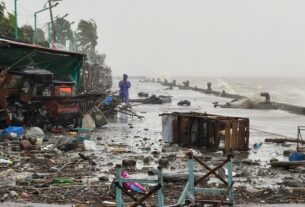After 43 tense days that left hundreds of thousands of American workers unpaid and government services stalled, Congress finally brought an end to the longest shutdown in U.S. history. The shutdown, marked by bitter partisan conflict between Republicans and Democrats, came to a close as the Republican-led House approved a Senate-backed package to reopen federal departments and agencies.
House Speaker Mike Johnson did not mince words before the vote, sharply criticizing Democrats for the standoff. “They knew that it would cause pain, and they did it anyway,” he said. “The whole exercise was pointless. It was wrong and it was cruel.”
The legislation, which former President Donald Trump was scheduled to sign later in the evening, funds military construction, veterans’ affairs, the Department of Agriculture, and Congress through next fall, while funding the rest of the government until the end of January. About 670,000 furloughed civil servants are set to return to work, alongside another 670,000 employees who remained on duty without pay, including air traffic controllers and airport security staff, who will now receive back pay.
The deal also restores jobs to federal workers who had been fired during the shutdown. Air travel disruptions, which had impacted airports nationwide, are expected to normalize gradually.
Trump, as usual, weighed in on social media, wrongly claiming Democrats had cost the country $1.5 trillion through “viciously closing our Country.” Meanwhile, analysts estimate the shutdown caused approximately $14 billion in lost economic growth.
Democrats had initially resisted reopening the government unless pandemic-era health care tax credits were extended, but a group of eight Senate moderates broke ranks to negotiate with Republicans. Though this compromise offers a vote on health care subsidies in the Senate, it provides no guaranteed action in the House, leaving Democratic leaders grappling with a sense of defeat.
House Minority Leader Hakeem Jeffries emphasized that, despite setbacks, the party had successfully spotlighted the Republican health care crisis, framing it as a key issue heading into the 2026 midterm elections. Yet, prominent Democrats, including California Governor Gavin Newsom and Illinois Governor JB Pritzker, criticized the agreement as weak, while former Transportation Secretary Pete Buttigieg called it a “bad deal.”
Outside Washington, the shutdown served as a reminder of the human cost of political deadlock—thousands of families navigating unpaid bills, disrupted plans, and uncertainty about the future. Amid the partisan blame, the resilience of federal workers and the everyday citizens affected remains a poignant story often lost in the political noise.





